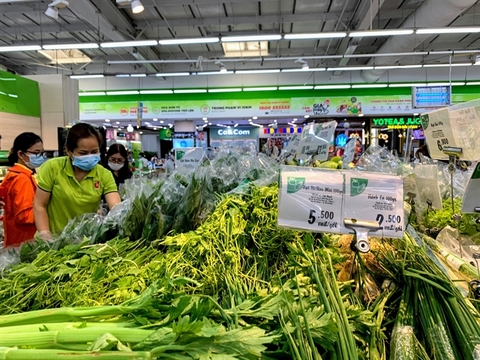
Ha Noi would encourage investment in developing modern retail systems, such as shopping centres and supermarkets.— Photo vietnambiz.vn
Ha Noi will focus on promoting trade and industry in the 2021-25 period to make trade a high-added-value sector and develop Ha Noi into the international trade centre of Viet Nam.
Accordingly, Ha Noi would encourage investment in developing modern retail systems, such as shopping centres and supermarkets.
Under the capital city’s industry and trade development plan to 2025, Ha Noi will develop five more wholesale centres and ten shopping centres at the regional level, 12 logistics centres, 68 shopping centres, 850 supermarkets and 140 markets.
Tran Thi Phuong Lan, Deputy Director of the municipal Department of Industry and Trade, said attracting private investment in developing infrastructure for trade remained difficult, especially in local and wholesale markets.
In addition, policies to manage modern trade models had not been promptly issued while modern commerce models were developing very rapidly.
Regarding industry, most large-scale production facilities had been moved out of the city centre, meaning that industrial production was narrowed.
Attracting investment in industrial zones and clusters was not comparative in terms of higher land lease prices than neighbouring provinces like Ha Nam, Hung Yen and Bac Ninh.
Lan said that according to the Resolution of the 17th Ha Noi Party Congress, the industry’s structure in the capital city would change significantly, with construction and industry accounting for 22.5-23 per cent, services by 65-65.5 per cent and agriculture accounting for a very modest proportion. This would have significant impact on the city’s industry and trade sector, Lan said.
Ha Noi expects industry to grow at an average rate of 7.5-8 per cent in the 2021-25 period, exports at 9.5-9.7 per cent, and retail sales of goods and services at 9-10 per cent.
To achieve the targets, the capital city would focus on removing difficultis for enterprises, especially those operating in spearhead and part-supplying industries and promoting the development of hi-tech and high-added value products, taking advantage of Industry 4.0.
In addition, the municipal authority would alo proactively call for investment in industrial infrastructure system and from high-tech enterprises. The city would also speed up the construction of 43 industrial clusters which were approved in 2018-20.
Industrial production increasingly contributes to the overall growth of the city’s gross regional domestic product (GRDP), making up 1.02 percentage points of the 7.16 GRDP growth rate in 2016 to 1.42 percentage points to the 7.63 GRDP growth rate in 2019.
In 2020, due to the impact of the COVID-19 pandemic, industrial production grew at 4.91 per cent, contributing 0.69 percentage points to the city’s 3.98 GRDP growth rate.
On average, industrial production increased by 8.3 per cent in the 2016-20 period.
Ha Noi also always took the lead in the country in ICT revenue with around 6,000 ICT companies and two out of five IT zones nationwide.
There were 17 in-operation industrial zones and hi-tech zones, 70 industrial clusters and 43 newly-founded industrial clusters.
The total retail sale of goods and services increased by an average of 10.54 per cent per year in the 2016-20 period while export revenue grew at 8.8 per cent, 1.68 per cent higher than the average in 2011-15.
There were 28 shopping centres, 142 supermarkets, 1,840 convenience store, 445 markets and 494 petrol stations in the city. — VNS